The Definitive Guide to Buying Contact Lenses:
Expert Advice for Clear Vision and Healthy Eyes
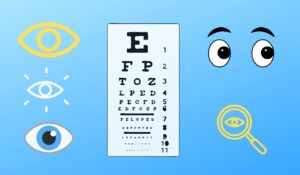
Welcome to my blog, your ultimate guide to buying contact lenses! Whether you’re in search of power contact lenses to correct your vision or colored contact lenses to enhance your eye color, you’ve come to the right place.
I’ll delve into the different types of lenses, their features, and how to navigate through power contact lens options to find the perfect fit for you.
For those looking to enhance their natural eye color or explore a whole new look, my blog covers all aspects of colored contact lenses.
Learn about the latest trends, and popular colors, and how to choose the most flattering shades for your eyes.
I am committed to providing accurate, reliable, and up-to-date information, ensuring that you are well-equipped to make confident decisions when buying contact lenses.
So, dive into my blog, explore my informative articles, and let me be your trusted source for all things related to power contact lenses and colored contact lenses.
Before we start go through this how-to video which I found on Youtube
The topics that we cover in this article are:
- What are contact lenses?
- Different types of Contact Eye lenses:
- Advantages and Disadvantages of Contact Eye Lens:
- How to choose the best contact eye lenses?
- Which are the best contact eye lens Brands available in India?
- What is the cost of contact lenses in India?
- How to buy Contact lenses online?
So without wasting time, let’s dive deeper into it:
What are contact lenses ??
Contact lenses are modern engineered medical-devices which can be placed directly on the eye’s cornea to correct vision problems. Contact lens offer a very convenient and more effective alternative as compared to traditional eyeglasses. These small, thin, and lightweight lenses come in various types, like contact lenses with power including soft and rigid gas permeable (RGP) lenses.
Soft contact eye lenses are made of a flexible plastic material that allows oxygen to pass through to the cornea, ensuring comfort and eye health.
On the other hand, RGP lenses are made of a rigid, durable material that provides excellent visual acuity and is suitable for certain vision conditions.
Both types of contact lenses with power can correct common refractive errors such as nearsightedness, farsightedness, and astigmatism.
Power Contact lenses require a valid prescription from an eye care professional, obtained through a comprehensive eye examination.
These examinations assess not only the prescription needed for vision correction but also the overall health of the eyes.
Proper fitting is crucial to ensure comfort and optimal visual correction. Different contact lenses have varying replacement schedules, ranging from daily disposables to extended-wear lenses that can be worn continuously for up to 30 days.
It is important to follow the recommended wearing schedule and practice proper use and care to reduce the risk of eye infections.
Regular check-ups with an eye care professional are necessary to monitor eye health and make any necessary adjustments to the prescription or lens type.
Different Types Of Contact Eye Lenses:
Soft Contact Lens: Soft contact lenses are made from a flexible, water-containing plastic material that allows oxygen to reach the cornea.
They are the most commonly used type of contact lens due to their comfort and ease of use. Soft lenses conform to the shape of the eye, providing a natural and comfortable fit.
They are available in various options, including daily disposable lenses, which are discarded after a single use; monthly or bi-weekly disposables that are replaced on a regular schedule.
Whereas extended-wear lenses can be worn continuously, including overnight, for a specific duration as recommended by an eye care professional.
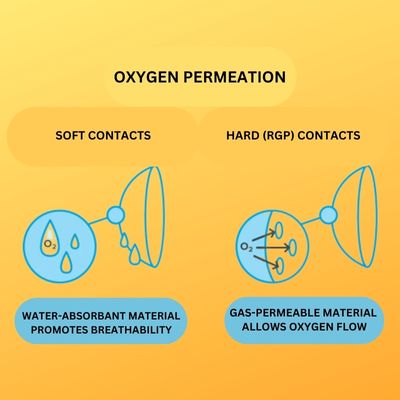
Based on Disposability Eye contact Lenses: Daily, Monthly, and Yearly Disposable Contact Lens: Contact eye lenses can be categorized based on their disposability.
Daily disposable lenses are worn once and then discarded, eliminating the need for cleaning and storage.
Monthly or bi-weekly disposable lenses are replaced on a regular schedule, providing a balance between convenience and cost-effectiveness.
Yearly disposable lenses, as the name suggests, are designed to be replaced once a year.
The choice of disposability depends on personal preference, lifestyle, and budget, and it is important to follow the recommended replacement schedule to maintain good eye health.
Extended Wear Eye Lens: Extended wear eye lenses are designed to be worn continuously, including during sleep, for a specific period as recommended by an eye care professional.
These lenses are made from highly breathable materials that allow sufficient oxygen to reach the cornea. Extended-eye lenses offer convenience for those who prefer not to remove their lenses daily.
However, it is important to follow the prescribed wearing schedule and practice proper cleaning and maintenance to minimize the risk of eye infections and complications.
Gas Permeable Eye Contact Lenses: Gas permeable (GP) contact lenses, also known as rigid gas permeable (RGP) lenses, are made from a rigid, durable material that allows oxygen to pass through to the cornea.
These lenses provide excellent visual acuity and are particularly suitable for individuals with complex vision conditions or irregular corneas.
GP lenses can correct a wide range of refractive errors, including astigmatism, and are known for their durability and longevity.
However, they may need some longer adaptation period as compared to soft lenses.
Aspheric Contact Lens: Aspheric contact lenses are designed with a more gradual curvature across the lens surface, resulting in a smoother transition of light as it enters the eye.
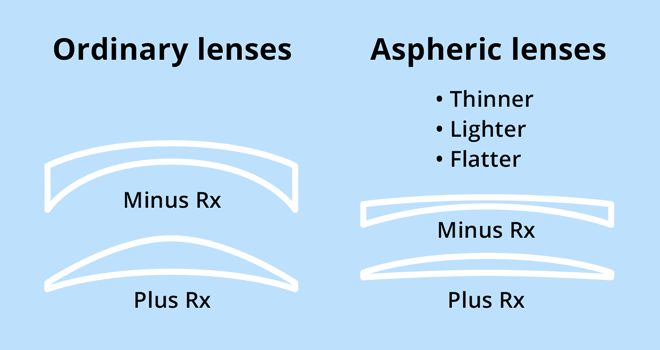
This design helps to reduce visual distortions and improve clarity, especially in low-light conditions.
Aspheric lenses are available for both nearsightedness and farsightedness corrections and can be found in both soft and gas-permeable materials.
Toric Contact Lenses: Toric contact lenses are specifically designed to correct astigmatism, a common condition caused by an irregularly shaped cornea or lens.
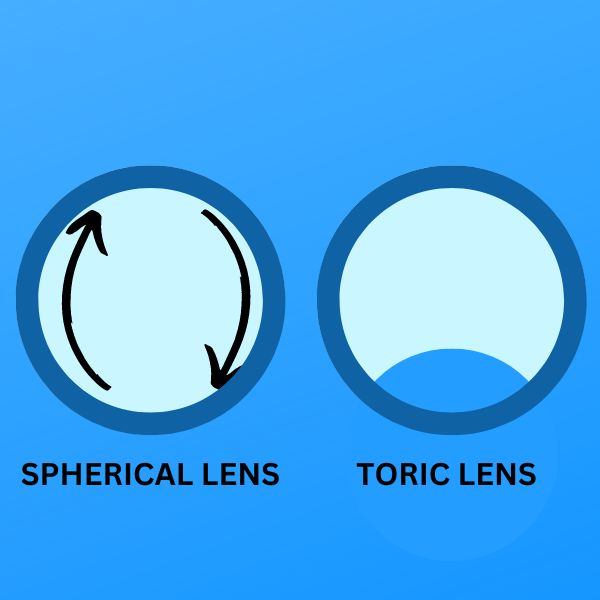
These lenses have different powers in different meridians of the lens to address the varying degrees of astigmatism.
Toric lenses are available in both soft and gas-permeable materials and offer reliable vision correction for individuals with astigmatism.
UV Protection Contact Lenses: UV protection contact lenses are designed to block a significant amount of harmful ultraviolet (UV) radiation from reaching the eyes.
These lenses help to protect the delicate tissues of the eye from potential damage caused by long-term exposure to UV rays. It is important to note that UV protection contact lenses provide additional defense.
They should not be considered a substitute for UV-blocking sunglasses or wide-brimmed hats for comprehensive eye protection.
Colored Eye Contact Lens: Coloured contact lenses allow individuals to change or enhance the natural color of their eyes.
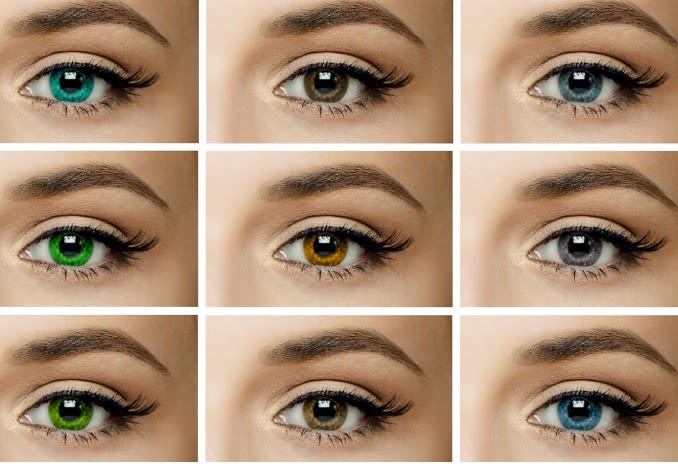
These lenses are available with or without vision correction and can be used for cosmetic purposes, theatrical performances, or simply to try a different look.
- Power contact lenses: Also known as prescription contact lenses, are specifically designed to correct refractive errors and provide clear vision for individuals with myopia (nearsightedness), hyperopia (farsightedness), astigmatism, or presbyopia.
These lenses come in various types, including soft and rigid gas permeable, and are available for daily wear, extended wear, or disposable use.
Power contact lenses are prescribed based on the individual’s unique vision needs and are an effective alternative to eyeglasses, offering convenience, improved peripheral vision, and freedom of movement while maintaining accurate vision correction.
Advantages and Disadvantages of Contact Lenses:
Soft Contact Lenses: Advantages:
- Comfort: Soft contact lenses are known for their comfort, as they are made from a flexible and breathable material that conforms to the shape of the eye.
- Wide Range of Correction: Soft lenses can correct various vision problems, including nearsightedness, farsightedness, and astigmatism.
- Easy Adaptation: Many people find it easier to adapt to wearing soft contact lenses compared to rigid gas permeable (RGP) lenses.
- Suitable for Active Lifestyles: Soft lenses are ideal for sports and physical activities as they provide stable vision and do not easily dislodge or break.
Soft Contact Lenses Disadvantages:
- Higher Replacement Cost: Soft lenses need to be replaced more frequently, which can result in higher long-term costs compared to RGP lenses.
- Vulnerable to Tear and Debris: The soft material of these lenses can attract and retain debris and tear more easily, requiring careful cleaning and maintenance.
- Lower Oxygen Permeability: Some types of soft lenses have lower oxygen permeability compared to RGP lenses, which may lead to reduced eye health in certain individuals.
Gas Permeable (GP) Contact Lenses: Advantages:
- Excellent Visual Acuity: GP lenses provide crisp and clear vision, particularly for individuals with astigmatism or higher levels of refractive error.
- Longer Lifespan: GP lenses are more durable than soft lenses and can last for several years with proper care, resulting in potential long-term cost savings.
- Superior Oxygen Permeability: These lenses allow a higher amount of oxygen to reach the cornea, promoting better eye health and reducing the risk of certain complications.
Gas Permeable (GP) Contact Lenses: Disadvantages:
- Initial Adaptation Period: Compared to soft lenses, GP lenses may require a longer adaptation period for the eyes to adjust to the rigid material.
- Less Comfortable: Some wearers may find GP lenses less comfortable initially due to their rigid nature. However, comfort typically improves with time as the eyes adapt.
- Higher Risk of Dislodgment: GP lenses are more likely to dislodge from the eyes during physical activities compared to soft lenses.
Daily Disposable Contact Lenses: Advantages:
- Convenience: Daily disposable lenses eliminate the need for cleaning and storage, providing a hassle-free and hygienic option.
- Reduced Risk of Eye Infections: Fresh, sterile lenses worn each day minimize the risk of bacterial or fungal buildup, lowering the chance of eye infections.
- Great for Occasional Wearers: Daily disposables are ideal for individuals who wear contact lenses infrequently or on special occasions, eliminating the need for long-term lens care.
Disadvantages:
- Cost: Daily disposable lenses can be more expensive over time compared to other types of contact lenses, especially for regular, everyday wear.
- Environmental Impact: The frequent disposal of daily lenses contributes to plastic waste, making them less environmentally friendly than other options.
Extended Wear Contact Lenses: Advantages:
- Continuous Wear: Extended-wear lenses can be worn overnight or continuously for several days, providing convenience for individuals who prefer not to remove their lenses frequently.
- Suitable for Irregular Schedules: They are beneficial for individuals who work night shifts or have unpredictable sleep patterns.
- Fewer Lens Interactions: Extended-wear lenses minimize the need for constant lens insertion and removal, reducing the risk of eye irritation or dryness associated with frequent handling.
Disadvantages:
- Increased Risk of Complications: Extended-wear lenses carry a higher risk of eye infections and other complications compared to daily-wear lenses due to the extended period of continuous wear.
- Strict Adherence Required: Following the recommended wearing schedule and proper lens cleaning and maintenance is crucial to minimize the risk of complications.
- Not Suitable for Everyone: Some individuals may have eyes that are more prone to complications from extended wear, and it may not be recommended for them.
It’s important to consult with an eye care professional to determine the most suitable type of contact lens based on individual needs, lifestyle, and eye health.
Choosing the Best Contact Lenses:
Consultation with an Eye Care Professional:
Schedule an appointment with an eye care professional, such as an optometrist or ophthalmologist, for a comprehensive eye exam and contact lens fitting.

They will assess your eye health, measure your prescription, and provide guidance on the most suitable contact lens options for your specific needs.
Consider Your Vision Correction Needs:
Discuss your vision correction needs with your eye care professional. Whether you are suffering from nearsighted, farsighted, or have astigmatism.
If or require multifocal lenses, there are different contact lens options available to address your specific prescription requirements.
The type of contact lens that best corrects your vision will depend on your eye condition and lifestyle.
Determine the Eye Lens Type:
Consider the different types of contact lenses available, such as soft lenses, rigid gas permeable (RGP) lenses, or specialty lenses.
Soft lenses are generally more comfortable and easier to adapt to, while RGP lenses provide sharper vision and are more durable.
Specialty lenses, such as toric lenses for astigmatism or multifocal lenses for presbyopia, cater to specific vision conditions.
Assess Lifestyle and Daily Routine:
Evaluate your lifestyle and daily routine to determine the most suitable contact lens option. Factors to consider include your activity level, occupation, and preferred wearing schedule.
For example, if you engage in sports or physical activities, consider lenses that provide stable vision during movement.
If you prefer the convenience of not having to clean and store lenses, daily disposables may be a suitable choice.
Follow Proper Use and Care Guidelines:
Ensure you are committed to practicing proper use and care of contact lenses. This includes following hygiene protocols, such as washing hands before handling lenses.
Ensure you always place the contact lens in contact solution, as contact solution is an essential product used for cleaning, disinfecting, and storing contact lenses, ensuring their longevity and maintaining optimal hygiene.
Contact solution helps remove debris, protein buildup, and bacteria, keeping your contact lenses fresh and comfortable for safe and healthy wear.
Properly cleaning and disinfecting lenses as recommended, and replacing them according to the recommended schedule.
Adhering to these guidelines will help maintain good eye health, reduce the risk of complications, and ensure optimal vision correction.
Remember, the advice and recommendations provided by an eye care professional should always take precedence when choosing contact lenses.
They will consider your individual eye health, prescription, and lifestyle factors to help you make the best decision.
What are the best Contact Lens brands available in India? :
In India, there are several reputable contact lens brands known for their quality and reliability. Some of the popular contact lens brands available in India:
Bausch + Lomb:
Bausch + Lomb is a globally recognized brand that offers a wide range of contact lenses. They are known for their high-quality lenses designed to provide excellent vision correction and comfort.
Bausch + Lomb offers various options, including daily disposables, monthly disposables, toric lenses for astigmatism, and multifocal lenses for presbyopia.
Their lenses are made with advanced materials and technologies, ensuring optimal vision and eye health.
Johnson & Johnson Vision:
Johnson & Johnson Vision is a trusted name in the contact lens industry. They offer a diverse range of contact lenses, including daily disposables, monthly disposables, toric lenses, and multifocal lenses.
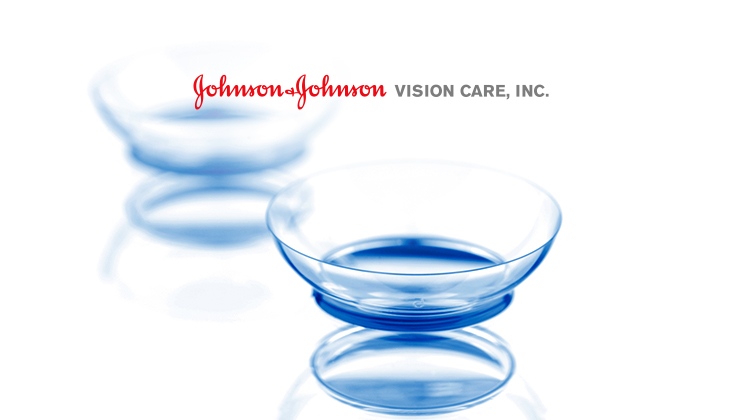
Their lenses are known for their exceptional comfort, easy handling, and superior vision correction.
Johnson & Johnson Vision is committed to innovation and offers lenses with advanced features such as UV protection and moisture retention.
Acuvue:
Acuvue, a brand by Johnson & Johnson Vision, is renowned for its high-quality contact lenses. Acuvue lenses are made with advanced technologies, ensuring comfort, breathability, and clear vision.
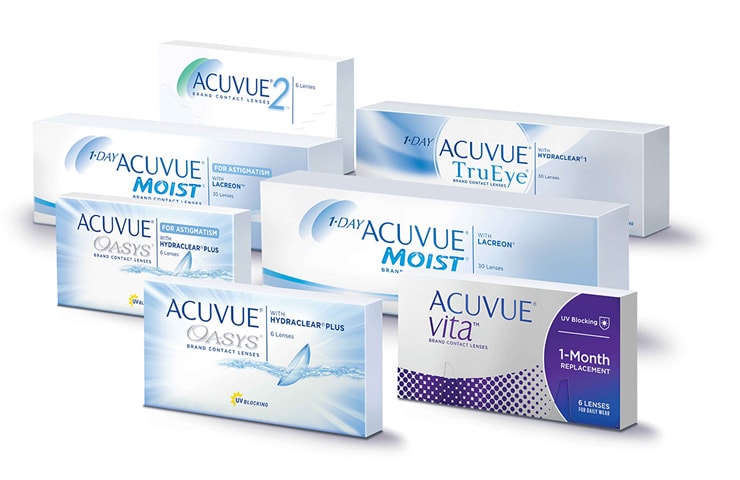
They offer a variety of options, including daily disposables, weekly disposables, toric lenses, and multifocal lenses.
Acuvue lenses are designed to provide all-day comfort, UV protection, and ease of use.
Alcon:
Alcon is a leading global eye care company offering a range of contact lenses under brands like Air Optix, Dailies, and FreshLook.
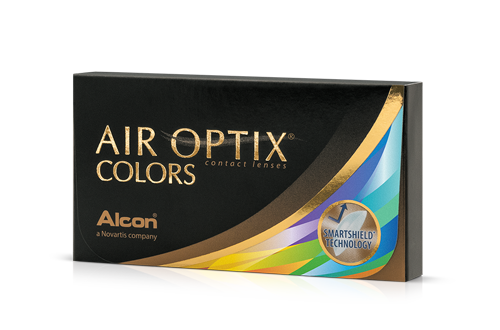
Air Optix lenses are known for their breathable design, allowing oxygen to reach the eyes. Dailies offer convenient daily disposable lenses suitable for various vision correction needs.FreshLook lenses provide a wide range of colored contact lenses to enhance or change eye color. Alcon’s lenses are known for their quality, comfort, and visual performance.
CooperVision:
CooperVision is a prominent contact lens manufacturer with a wide range of options to cater to different vision needs.
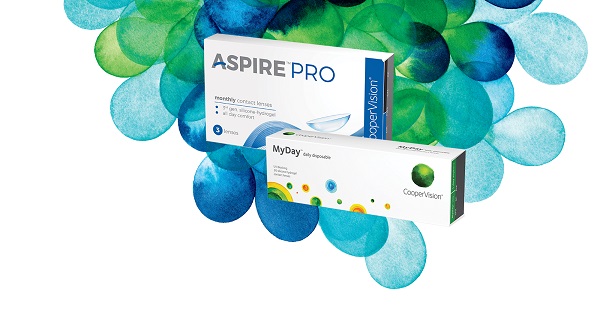
Their lenses are known for their comfort, durability, and excellent vision correction. CooperVision offers daily disposables, monthly disposables, toric lenses, and multifocal lenses.
They use advanced lens materials and innovative designs to provide optimal visual clarity and comfort.
Freshkon:
Freshkon is a popular brand known for its colored contact lenses. They offer a wide range of vibrant and natural-looking colored lenses that allow wearers to enhance or change their eye color.
Freshkon lenses are made with advanced technology, ensuring comfort, breathability, and UV protection.
They provide a variety of options to suit different preferences and styles.
It’s important to consult with an eye care professional to determine the most suitable contact lens brand and type based on your individual needs, prescription, and eye health.
How to buy Contact Lenses online?
Buying Contact Lenses Online:
Obtain a Valid Prescription:
Before purchasing contact lenses online, ensure you have a valid prescription from an eye care professional.
Contact lens prescriptions are typically separate from eyeglass prescriptions and include specific details such as lens power, base curve, and diameter.
Prescription validity varies by jurisdiction, so make sure your prescription is up to date.
Choose a Reputable Online Retailer:
Select a trusted and reputable online retailer that specializes in contact lenses. Look for websites that offer a wide selection of brands and types.
He should also have positive customer reviews, and provide secure payment options.
Ensure the retailer complies with applicable laws and regulations regarding the sale of contact lenses.
Enter Prescription Details:
On the retailer’s website, navigate to the contact lenses section and select the type and brand of lenses you require.
Enter your prescription details accurately, including lens power, base curve, and any additional parameters specific to your prescription. Double-check the information to avoid errors.
Consider Lens Options and Features:
Explore the various lens options available, such as daily disposables, monthly disposables, toric lenses, or multifocal lenses.
Consider additional features like UV protection or colored lenses if desired. Read product descriptions and specifications to ensure you select the lenses that best meet your needs.
Compare Prices and Promotions:
You must need to compare prices among the different online retailers to find the best deal. Keep an eye out for promotions, discounts, or bundle offers that can help save money.
However, prioritize quality and authenticity over price, as it is important to purchase genuine and reliable contact lenses for your eye health.
Check Shipping and Return Policies:
Review the retailer’s shipping policies, including delivery times, shipping fees, and tracking options. Ensure they offer secure packaging to protect the lenses during transit.
Additionally, familiarize yourself with the return and exchange policies in case you need to return or exchange the lenses due to issues with fit or quality.
Provide Prescription Verification:
Most reputable online contact lens retailers require prescription verification to ensure compliance with legal and safety standards.
You may need to provide your eye care professional’s contact information, and the retailer may contact them to verify your prescription.
This step is crucial to ensure you receive the correct lenses and avoid potential complications.
Complete the Purchase:
Once you have selected the desired contact lenses, added them to your cart, and verified your prescription, proceed to the checkout page.
Provide accurate shipping and billing information, select your preferred payment method, and review the order details before finalizing the purchase.
Remember, while buying contact lenses online offers convenience, it is crucial to prioritize safety, authenticity, and compliance with prescription regulations.
Regular eye exams and consultations with an eye care professional are essential for maintaining good eye health when wearing contact lenses.
What is the Cost of Contact Lenses in India?
The cost of contact lenses in India can vary depending on several factors, including the brand, type of lenses, prescription requirements, and additional features. Here is a general overview of the cost range for contact lenses in India:
-
Cost of Daily Disposable Lenses:
The cost of daily disposable contact lenses in India typically ranges from around INR 400 to INR 1,500 per box.
The price can vary based on the brand, the number of lenses in a box (usually 30 or 90 lenses), and any additional features such as UV protection or moisture retention.
-
Cost Of Monthly Disposable Lenses:
Monthly disposable contact lenses are designed to be worn for about a month before replacement. The cost of monthly disposable lenses in India generally falls within the range of INR 300 to INR 2,500 per box.
The price may vary depending on factors such as the brand, lens material, and any specialized features like toric lenses for astigmatism or multifocal lenses.
-
Cost of Extended Wear Lenses:
Extended wear contact lenses, which can be worn continuously for an extended period, typically have a higher cost compared to daily or monthly disposables.
The price range for extended wear lenses in India is usually around INR 1,000 to INR 5,000 per box, depending on the brand and prescription requirements.
-
Cost of Specialty Lenses:
Specialty lenses, such as toric lenses for astigmatism or multifocal lenses for presbyopia, may have a higher cost compared to standard contact lenses.
The price range for specialty lenses in India varies depending on the brand, type, and prescription requirements, generally falling within the range of INR 1,000 to INR 6,000 per box.
-
Cost of Non-Prescription Colored Lenses:
Non-prescription colored contact lenses, also known as plano lenses, are designed for cosmetic purposes and do not correct vision.
The cost of non-prescription colored lenses in India typically ranges from around INR 300 to INR 1,500 per pair.
The price may vary based on the brand, color intensity, and any additional features like UV protection.
-
Cost of Prescription Colored Lenses:
Prescription colored contact lenses are designed to correct vision while also changing or enhancing the eye color.
The cost of prescription colored lenses in India generally falls within the range of INR 500 to INR 2,500 per pair.
The price can vary depending on factors such as the brand, lens material, prescription requirements, and any specialized features.
It’s important to note that these price ranges are approximate and can vary based on factors such as the retailer, discounts or promotions, and the specific prescription requirements.
It’s recommended to consult with an eye care professional and compare prices from reputable sellers to find the best option that suits your needs and budget.
Frequently Asked Questions:
The recommended wearing time for contact lenses varies depending on the type and brand. Generally, daily wear lenses can be worn for up to 12-16 hours a day.
While extended wear lenses are designed for continuous wear for a specific period, usually up to 30 days. However, it’s important to follow the specific instructions provided by your eye care professional to avoid eye irritation or complications.
The choice between contact lenses and glasses depends on personal preferences and individual circumstances.
Contact lenses provide advantages such as a wider field of vision, freedom of movement, and the ability to participate in sports or other physical activities without the concern of glasses getting in the way.
Glasses, on the other hand, are generally easier to use and require less maintenance. Ultimately, it’s a personal decision based on factors like comfort, convenience, and lifestyle.
The comfort of contact lenses can vary depending on individual preferences and eye conditions. However, many people find soft contact lenses to be the most comfortable due to their flexibility and ability to conform to the shape of the eye.
Silicone hydrogel lenses are often considered comfortable as they allow more oxygen to reach the eyes. It’s best to consult with an eye care professional to find the most comfortable contact lenses for your specific needs.
Yes, contact lenses have an expiration date. It is important to check the packaging or consult the manufacturer’s instructions for the specific expiration date.
Expired contact lenses can lose their effectiveness and may pose a risk to eye health.
It’s crucial to use contact lenses within their recommended shelf life and follow proper storage and replacement guidelines.
Contact lenses are designed to correct various vision problems, such as nearsightedness, farsightedness, astigmatism, and presbyopia.
When worn correctly and with the appropriate prescription, contact lenses can provide clear and improved vision compared to uncorrected vision.
However, it’s important to have regular eye exams and follow the recommendations of your eye care professional to ensure proper vision correction and eye health.
It is generally recommended to remove contact lenses before washing your face. This helps prevent the risk of water, soap, or other facial products coming into contact with the lenses, which may cause discomfort, irritation, or potential eye infections.
It’s best to remove your contact lenses and store them properly before washing your face, and then reinsert them once your face is clean and dry.
Table of Contents
Summary:
In summary, contact lenses offer a convenient and effective solution for vision correction. They come in various types, including soft, rigid gas permeable, and colored lenses.
The cost of contact lenses in India can vary based on factors such as the brand, type, and prescription requirements. It is important to choose the best contact lens brand that suits your needs and consult with an eye care professional for a proper fitting and prescription.
Contact lenses can be worn for a specific duration each day, depending on the type of lenses. They provide clear vision and are a popular alternative to glasses, offering comfort and freedom of movement. However, it is essential to follow proper hygiene practices, replace lenses as recommended, and have regular eye exams.
Join our community of vision enthusiasts and be the first to know about the latest trends, new product releases, and special promotions.
Simply enter your email address in the subscription box below and hit the subscribe button.
Don’t miss out on the opportunity to enhance your knowledge about contact lenses and make informed decisions for your eye health.

